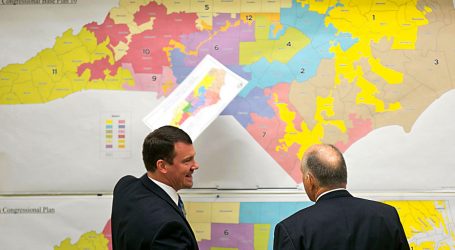Barack Obama & The Illusion of Progress
Everyone has a favorite Obama moment. Maybe it’s the time he leaned over and whispered in Michelle’s ear, producing this iconic photograph. Maybe it was watching him break out into a very sweet Al Green rendition. Perhaps it’s when he brushed his shoulder off. There are dozens, if not hundreds more of these moments. Barack Obama is the epitome of “Black cool.” Not only that, he is arguably one of the best political orators in recent memory. He went to Harvard Law. He is married to Michelle Obama. He is unequivocally funny and charming.
My favorite Obama moment? When he bent down and let a little Black boy touch his hair, proving to the little boy that they were indeed the same. The importance of that moment for that child and for Black people in the U.S. cannot be understated. Barack Obama’s presidency has long-reaching and deep symbolic significance.
It has been, however, largely symbolic.
Recently, the White House released a special report on President Obama’s track record in improving the lives of African Americans during his two terms as president. Bank oversight, private sector jobs and legislation aimed at keeping people in their homes are all named. In 2009, Obama told American Urban Radio Network that he couldn’t make legislation just helping Black people. And he kept that promise. While all points in the report are true, how they specifically helped African Americans is somewhat exaggerated. The addition of private sector jobs lowered overall unemployment, yet joblessness among Black Americans remains higher than average at 8.8 percent. While programs to help stabilize low income neighborhoods and prevent foreclosures were funded, Blacks in America still saw the largest wealth gap since World War II.
While it would be unrealistic to blame Obama for these things, it isn’t unrealistic to notice that his insistence on ignoring race while forming economic policy in a country where race impacts everything from personal wealth to employability means the Black community continues to suffer.
In fact, a recent study indicates if nothing changes, the average Black family would need 228 years to achieve the wealth of a White family in 2016. For any president, not creating policy addressing our community’s specific needs—needs created by ongoing discrimination and oppression—often meted out by the government itself is irresponsible, if not callous. In Obama’s case, it creates a frustrating paradox, the first Black president feels he cannot advocate, even fairly, for Black people.
We get the illusion of progress, a symbol of representation, not the actual action. What does representation truly mean for us then, if our representative cannot vouch for our interests?
This too is a large part of Obama’s legacy; continuing and expanding policies and programs started by and under his predecessor George W. Bush. In 2011, Obama extended “The Lone Wolf” provision, along with other expiring parts of Bush’s Patriot Act. Under Bush, there was protest from Democrats and Black activists about the increased surveillance of American citizens. Under Obama there was no push back of equal vehemence, even as the provisions still impacted communities of color disproportionately.
There was also the issue of Homan Square in Chicago. As of July 2016, Homan Square is a domestic ‘black site’ which has been known to hold Black and brown American citizens for as long as 24 hours, incommunicado. Police had free reign to harass and hold Chicago residents as they please, without having to read them their rights, communicate with lawyers or follow the amendments set in place to protect us from government and police abuse. When given the opportunity to suspend some of the more overreaching aspects of The Patriot Act, Obama chose to extend them. While we cannot definitely say Obama’s refusal to extend provisions within the Patriot Act would have closed Homan Square and other domestic black sites, his signing allows them to continue with little to no public accountability.
Next, his Race To The Top education policies continued Bush’s misguided work of privileging charter schools that kick low performing students back to public school; gutting teacher’s unions; privileging the White middle class and favoring new college graduates over seasoned teachers. LA Progressive took a look at how Obama’s education policies not only promote for-profit charters but the adverse economic impact that they have in largely Black and minority school districts.
Still, Obama’s immigration record is possibly the most stark example of his politics. While we credit him for the executive order that made DACA possible, we do not fairly credit him with an immigration plan that increased policing in Black and brown neighborhoods, one that gave local police officers and ICE departments the reach to deport Black immigrants at 5 times the rate of our presence in this country.
Obama rationalizes his actions as a “good immigrant” versus “bad immigrant” dichotomy, but when combining greater police reach with well documented racism, this outcome is inevitable: a large portion of those deported are nonviolent offenders, with only 25 percent of those deported being convicted of a violent or felony crime. DUI charges are listed as violent crimes for the purposes of immigration and therefore deportation.
This is Obama’s legacy: more deportations than any other president in the 20th century. More deportations of Black immigrants than under presidents George W. Bush and Bill Clinton.
Often when looking at the last eight years, we excuse the lack of progress as Obama’s “hands being tied” as the first Black president. We think of his darling family and his moving speeches—often more left leaning than his actual policies—against the tide of racist vitriol and see someone like us, someone well meaning but unable to do much against the set in stone White supremacy that is as American as apple pie.
This empathetic approach ignores the fact that when Obama can and does act, it is a revelation of his politics. He is not the progressive the Black community needs but a politician who happens to be Black; one that America approves of, symbolic of “change” that doesn’t disrupt. His presidency highlights the problem with representation in an oppressive system: the only progress is the changing face of who perpetuates the oppression.
Lesli-Ann Lewis is a small, queer and brown invader of homogeneous spaces. Her work and passion centers on the marginalized experience and has appeared in Ebony.com and RH Reality, among others.




